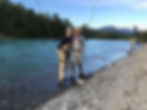I "Worked" the Night Shift in Alaska
- Frank Pereira
- Jul 28, 2018
- 3 min read
Our bodies body’s Circadian Rhythm, or biological clock, is controlled by a bundle of cells (the hypothalamus) atop the bridge of the nose in your head. It tells a person when to wake up, when to go to sleep, and when to use the bathroom among other things. Circa means “about”, and dian means “daily,” so these are daily rhythms and they are the products of the biological clock. When the biological clock is in sync with the clock on the wall, everything works smoothly. When we ask our bodies to experience the day differently, then the biological clock can get out of sync and experience a breakdown. An out of balance cycle leads to increased health, safety, and performance problems. What happens when that rhythm is completely disrupted, and daylight lasts until 11:00 pm? I found out on a recent trip to Alaska.
Imagine fishing for Salmon at night in full daylight. Okay, do you the picture in your head? This past weekend, I travelled north with some USNA midshipmen on the way to their next duty assignment – mountaineering in the Alaskan wilderness. We had a chance to fish for Sockeye Salmon on the Kenai River. We took this picture at 9:30 pm; and it was still pretty much daylight. Sunset was still two hours away! After a four day trip, I got home yesterday more tired than if I had been working a week of night shifts. What happened?
Because of the change in the hours of sunlight and days were so long, we never felt tired, so we never went to bed. Our brains were not receiving the signal that it was nighttime because it was not dark. On the first night we stayed up to watch the sunset at 11:30 pm, and then we were up bright and early the next day. This cycle continued the whole trip. I had a headache each morning but was never ready to go to bed. In the evening, my body was telling me to stay up even though I knew it was past my regular bedtime. When your circadian rhythm is disrupted due to jet lag, daylight savings time, or an Alaskan fishing trip like mine that kept me up until the wee hours of the morning each day, you will feel tired and out of sorts just like I did. On the last night, I asked one of the locals how he survived this each summer. He said each year was pretty much the same. “Each summer you tough out the first ten days with little sleep. On the tenth day you fall asleep wherever you are for about fifteen hours, and when you get up, you are used to it.”
On the plane home, as I drifted off the sleep, I pondered how my experience with a disrupted circadian rhythm affected me. I thought, “This is the same experience of night shift workers have when they get off work and deal with the bright sun.” If they don’t get home before it becomes bright, their bodies are going to want to stay up. We know from medical research that sunlight is one of the most significant factors affecting our circadian rhythms. This trip was just an affirmation of how powerful a factor the sun can be and the importance of a regular sleep/wake cycles. We can all play a role in helping ourselves, or our fellow night shift employees, have a good sleep/wake pattern.
Talk to us about how Coleman Consulting Group can help you create the perfect schedule for your employees that will allow them a healthier life.

